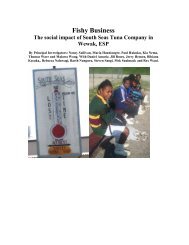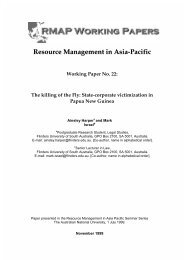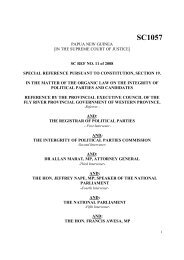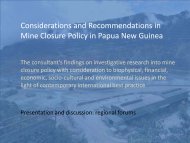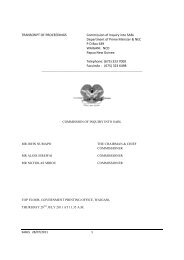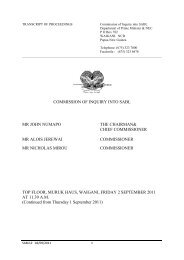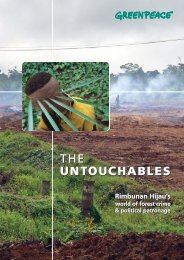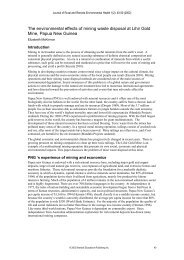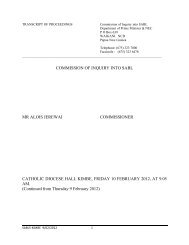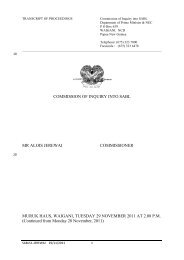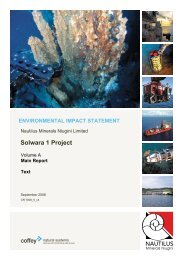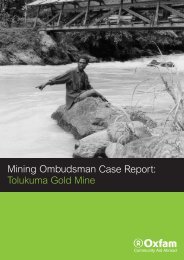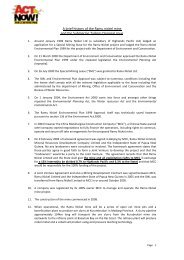Oxfam Australia and CAER: The right to decide
Oxfam Australia and CAER: The right to decide
Oxfam Australia and CAER: The right to decide
Create successful ePaper yourself
Turn your PDF publications into a flip-book with our unique Google optimized e-Paper software.
Resettlement<br />
In many circumstances impacts on indigenous peoples may<br />
involve the relocation of entire communities. <strong>The</strong> IFC sets<br />
st<strong>and</strong>ards on l<strong>and</strong> acquisition <strong>and</strong> involuntary resettlement<br />
(Performance St<strong>and</strong>ard 5) <strong>and</strong> requires FPIC for relocation<br />
of indigenous peoples (Performance St<strong>and</strong>ard 7). <strong>The</strong> World<br />
Bank <strong>and</strong> other development banks have involuntary<br />
resettlement safeguards as core policies which cover the<br />
impact on individuals who face involuntary resettlement from<br />
development projects. All resettlement poses serious human<br />
<strong>right</strong>s risks. However, the special relationship <strong>to</strong> the l<strong>and</strong> held<br />
by indigenous peoples means relocation can have disastrous<br />
impacts on a range of human <strong>right</strong>s, including <strong>to</strong> culture <strong>and</strong><br />
livelihood.<br />
A company should only participate in resettlement in<br />
exceptional circumstances, <strong>and</strong> must only do so if the FPIC<br />
of the affected indigenous peoples has been secured. In<br />
addition, it is widely acknowledged that companies should<br />
provide adequate compensation <strong>and</strong> res<strong>to</strong>ration of livelihoods<br />
<strong>to</strong> communities that are required <strong>to</strong> move from their l<strong>and</strong><br />
<strong>to</strong> enable the development of a project. Only six companies<br />
have provided public policies or guidelines in relation <strong>to</strong><br />
resettlement that are, at a minimum, consistent with the IFC<br />
Performance St<strong>and</strong>ards or World Bank safeguards.<br />
For example, the Rio Tin<strong>to</strong> resettlement guidance 36 is<br />
steered by the principles <strong>and</strong> content of the IFC Performance<br />
St<strong>and</strong>ard on l<strong>and</strong> acquisition <strong>and</strong> involuntary resettlement.<br />
It recognises that “the resettlement of communities <strong>and</strong><br />
people can have significant adverse impacts on their future<br />
life, social fabric <strong>and</strong> livelihoods”. <strong>The</strong> st<strong>and</strong>ard “requires<br />
businesses <strong>to</strong> ensure that resettled people are better off as<br />
a result of resettlement, according <strong>to</strong> their own assessment<br />
<strong>and</strong> external expert review”. However, challenges persist in<br />
the implementation of Rio Tin<strong>to</strong>’s policy frameworks around<br />
resettlement. Rio Tin<strong>to</strong> has recently engaged with civil<br />
society, including <strong>Oxfam</strong> who visited resettled communities in<br />
March 2013, <strong>and</strong> Human Rights Watch, in response <strong>to</strong> criticism<br />
regarding its resettlement program in Mozambique.<br />
Tools <strong>to</strong> facilitate consent<br />
While some companies have made, at minimum, a<br />
commitment <strong>to</strong> consult with indigenous peoples, there is<br />
very little information in the public domain as <strong>to</strong> how they<br />
will facilitate consultation or seek consent from indigenous<br />
peoples. Only one of the companies examined for this report<br />
published sufficient details <strong>to</strong> provide insight in<strong>to</strong> how they<br />
facilitate consultation.<br />
<strong>The</strong> types of things that a company can do, <strong>and</strong> should report<br />
on, include:<br />
• beginning a dialogue <strong>and</strong> consultation process<br />
with indigenous peoples that respects traditional<br />
representation <strong>and</strong> decision-making processes, <strong>and</strong> that<br />
includes the participation of women <strong>and</strong> men, <strong>and</strong> young<br />
<strong>and</strong> elderly people;<br />
• working with indigenous peoples <strong>to</strong> explore different<br />
options for project location <strong>and</strong> design;<br />
• making sure information is accessible <strong>and</strong> unders<strong>to</strong>od<br />
through use of interpreters or providing documents in<br />
locally unders<strong>to</strong>od languages;<br />
• disclosing information on how documents are provided <strong>to</strong><br />
the community <strong>and</strong> what other communication <strong>to</strong>ols have<br />
been used;<br />
• describing the time frame provided for the local community<br />
<strong>to</strong> make a decision, ensuring it reflects the local<br />
circumstances; <strong>and</strong><br />
• disclosing the scope of the engagement <strong>and</strong> who was<br />
involved.<br />
Reporting on these will assist all stakeholders, including<br />
inves<strong>to</strong>rs, <strong>to</strong> better underst<strong>and</strong> efforts taken by a company<br />
<strong>to</strong> avoid or mitigate potential negative impacts that affect<br />
indigenous peoples <strong>and</strong> other impacted communities.<br />
This can include the social, cultural (sacred sites or<br />
culturally important sites) or environmental impacts. It<br />
will also help ensure more meaningful engagement with<br />
impacted communities.<br />
36. Rio Tin<strong>to</strong>, Resettlement guidance: www.riotin<strong>to</strong>.com/documents/Resettlement_guidance_2011_2014.pdf<br />
13



